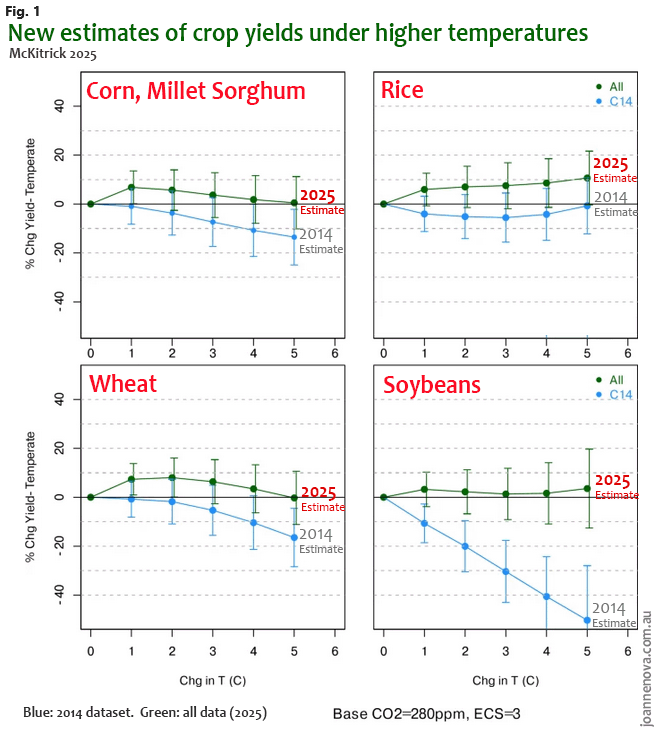By Jo Nova
Nearly every plea for carbon subsidies depends on “the Social Cost of Carbon”, and it’s wrong
Every ton of carbon dioxide we emit is supposedly going to cause $220 USD in losses in the future, which justifies throwing lots of money at efforts to reduce emissions — like subsidizing EVs and solar panels, and inventing cricket burgers. This is called the Social Cost of Carbon (SCC). But half of that imaginary cost was the devastation higher temperatures would theoretically wreak on agriculture — which doesn’t make sense given that plants eat CO2 for breakfast. But for years bureaucrats and scientists have been telling us the damage in crops was going to cost $102USD per ton of carbon, and investors and politicians have been feeding that into their cash registers, and it’s all wrong.
Ten years ago Challinor et al did a big meta-review of crop changes with temperature, using 1,722 records, but many of these records had no figures for CO2 itself. And the whole point of calculating the social cost of carbon really depends on calculating what happens when CO2 rises, and supposedly causes temperatures to rise too. In 2017 Moore et al took those numbers and simulated them into gloom and doom scenarios which the Biden team converted into a fivefold increase in the “cost of carbon”. So Ross McKitrick took the same data from 2014, and then used an estimate of Equilibrium Climate Sensitivity (ECS) of about 3 °C which is the standard IPCC type figure, and filled in a lot of the missing figures. After recalculating the crop yields at higher temperatures and higher CO2, he found that the benefits of the extra CO2 outdid any downsides of warmer temperatures.
Ross McKitrick shows that even in the unlikely (unbelievable) event that CO2 causes five degrees of warming — it is not going to reduce crop yields.
Billions of dollars has been spent based on the idea that all CO2 emissions are bad, and there is a “social cost of carbon”, but if CO2 increases crops (and farmers already pump it into greenhouses because it does) — then there goes half the “social cost of CO2”. Indeed, increasing crops must add wealth, pushing the net cost figures down even further.
Indeed, if we could arrange another degree or two of warming we could increase corn, rice and wheat by 5 or 10%. It is inhumane to deny the hungry people of the world, so obviously, any responsible civilization should be emitting more CO2. Go forth and drive your pick-up truck, buy that SUV, the boat and the private jet. Do it for the children. 🙂

McKitrick (2025). “Extended crop yield meta-analysis data do not support upward SCC revision”. Sci Rep 15, 5575. Edits were made to the heading by me.
C3 crops like wheat, soybeans and rice ought to benefit the most from extra CO2. C4 crops, like corn and sorghum (top left graph) have evolved to make the most of lower CO2 levels already so will get less of an advantage if CO2 returns to it’s former higher levels. The newer C4 pathways give such a growth advantage, allowing plants to thrive in hotter and drier environments, that they independently evolved at least 45 times in the last 15 to 30 million years. The reason the C4 plants didn’t take over the world is that they need more sunlight and don’t thrive in cooler or shadier areas.
Willie Soon, Ronan and Michael Connolly discuss McKitricks paper below in the video. See also Vijay Jayaraj at the Daily Signal.
REFERENCES
McKitrick (2025). “Extended crop yield meta-analysis data do not support upward SCC revision”. Sci Rep 15, 5575.
Challinor, A. J. et al. A meta-analysis of crop yield under climate change and adaptation. Nat. Clim Change 4(4), 287 (2014).
Moore, F. C., Baldos, U., Hertel, T. & Diaz, D. New science of climate change impacts on agriculture implies higher social cost of carbon. Nat. Commun. 8, 1607. https://doi.org/10.1038/s41467-017-01792-x (2017).